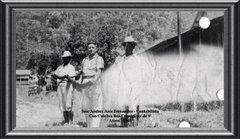
Upon request from American Heritage Magazine, 1962
There is little that is more important for an American citizen to know than the history and traditions of his country. Without such knowledge, he stands uncertain and defenseless before the world, knowing neither where he has come from nor where lie is going. With such knowledge, he is no longer alone but draws a strength far greater than his own from the cumulative experience of the past and a cumulative vision of the future.
Knowledge of our history is, first of all, a pleasure for its own sake. The American past is a record of stirring achievement in the face of stubborn difficulty. It is a record filled with figures larger than life, with high drama and hard decision, with valor and with tragedy, with incidents both poignant and picturesque, and with the excitement and hope involved in the conquest of a wilderness and the settlement of a continent. For the true historian—and for the true student of history—history is an end in itself. It fulfills a deep human need for understanding, and the satisfaction it provides requires no further justification.
Yet, though no further justification is required for the study of history, it would not be correct to say that history serves no further use than the satisfaction of the historian. History, after all, is the memory of a nation. Just as memory enables the individual to learn, to choose goals and stick to them, to avoid making the same mistake twice—in short, to grow—so history is the means by which a nation establishes its sense of identity and purpose. The future arises out of the past, and a country’s history is a statement of the values and hopes which, having forged what has gone before, will now forecast what is to come.
As means of knowledge, history becomes a means of judgment. It offers an understanding of both the variety and unity of a nation whose motto is E Pluribus Unum—out of many, one. It reminds us of the diverse abundance of our people, coming from all races and all parts of the world, of our fields and mountain ranges, deserts and great rivers, our green farmlands and the thousand voices of our cities. No revolution in communication or transportation can destroy the fact that this continent is, as Walt Whitman said, “a nation of nations.” Yet it also reminds us that, in spite of the diversity of ethnic origin, of geographic locale, of occupation, of social status, of religious creed, of political commitment, Americans are united by an ancient and encompassing faith in progress, justice, and freedom.
Our history thus tests our policy: Our past judges our present. Of all the disciplines, the study of the folly and achievements of man is best calculated to foster the critical sense of what is permanent and meaningful amid the mass of superficial and transient questions which make up the day-to-day clamor. The history of our nation tells us that every action taken against the freedoms of conscience and expression, against equality before the law and equality of opportunity, against the ordinary men and women of the country is an action taken against the American tradition. And it tells us that every action taken for a larger freedom and a more equal and spacious society is one more step toward realization of what Herbert Croly once called “the promise of American life.”
A knowledge of history is more than a means of judgment: It is also a means of sympathy—a means of relating our own experience with the experience of other peoples and lands struggling for national fulfillment. We may sometimes forget, for example, that the United States began as an underdeveloped nation which seized its independence by carrying out a successful revolution against a colonial empire. We may forget that, in the first years of the new republic, George Washington laid down the principle of no “permanent alliances” and enjoined the United States to a course of neutralism in the face of the great-power conflicts then dividing the civilized world. We may forget that, in the first stages of our economic development, our national growth was stimulated to a considerable degree by “foreign aid”—that is, investment from abroad—and by public investment and direction on the part of our state and local as well as our national government. We may forget that our own process of economic change was often accompanied by the issue of wildcat paper money, by the repudiation of bonds, by disorder, fraud, and violence. If we recall the facts of our own past, we may better understand the problems and predicaments of contemporary “new nations” laboring for national development in circumstances far less favorable than our own— and we will, in consequence, become less liable to the self-righteousness which is both unworthy of our own traditions and a bane of international relations.
A knowledge of history is, in addition, a means of strength. “In times of change and danger,” John Dos Passos wrote just before World War II, “when there is a quicksand of fear under men’s reasoning, a sense of continuity with generations gone before can stretch like a life line across the scary present.” Dos Passos called his book The Ground We Stand On—and the title concisely defines the role of the past in preparing us for the crisis of the present and the challenge of the future. When Americans fight for individual liberty, they have Thomas Jefferson and James Madison beside them; when they strive for social justice, they strive alongside Andrew Jackson and Franklin Roosevelt; when they work for peace and a world community, they work with Woodrow Wilson; when they fight and die in wars to make men free, they fight and die with Abraham Lincoln. Historic continuity with the past, as Justice Oliver Wendell Holmes said, “is not a duty; it is only a necessity.”
A knowledge of history is, above all, a means of responsibility—of responsibility to the past and of responsibility to the future … of responsibility to those who came before us and struggled and sacrificed to pass on to us our precious inheritance of freedom … and of responsibility to those who will come after us and to whom we must pass on that inheritance with what new strength and substance it is within our power to add. “Fellow citizens,” Abraham Lincoln said, “we cannot escape history. … The fiery trial through which we pass will light us down, in honor or dishonor, to the latest generation.” American history is not something dead and over. It is always alive, always growing, always unfinished— and every American today has Iris own contribution to make to the great fabric of tradition and hope which binds all Americans, dead and living and yet to be born, in a common faith and a common destiny.
In the final analysis, your attitude determines your effectiveness in everything, every time! LGL





